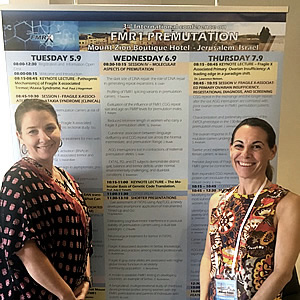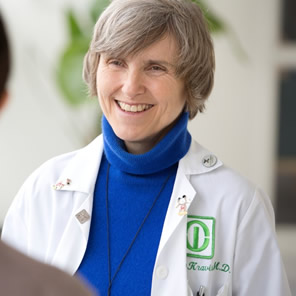Research
In June, Our Fragile X World researchers Don Bailey, Melissa Raspa, and Anne Wheeler attended the International Society on Early Intervention conference in Sydney, Australia. Don presented about newborn screening for fragile X syndrome and other developmental disorders. Melissa and Anne presented about an early intervention program for infants with fragile X syndrome.
Dr. Marsha Mailick, developmental disabilities researcher at the University of Wisconsin-Madison (UW-Madison), recently visited RTI and shared research she and her team have done to learn more about symptoms of fragile X premutation carriers. Their study used data sources that go back decades, including surveys, DNA samples, and electronic health records (EHR).
Lisa Gehtland, MD has made a career of helping babies get the best start in life through early genetic testing. Dr. Gehtland is the project director of Early Check, an important new $13 million, multi-year study led by RTI. Early Check offers expanded newborn screening for fragile X to babies in North Carolina. We interviewed her to learn more about the program, which launched this fall.
Data from electronic health records (EHRs) can help researchers learn more about conditions like fragile X. In turn, people with fragile X can benefit from research that uses their EHRs. But we need to balance benefits, such as developing better treatments, with protecting patients' privacy. This February, we'll invite hundreds of parents to take a survey about factors they might consider when deciding whether to let researchers use their child's EHRs for studies.
In September, Our Fragile X World researchers Melissa Raspa and Anne Wheeler attended the 3rd International FMR1 Premutation Meeting in Jerusalem, Israel, where they presented results of recent studies and learned about the exciting work that is being done by other fragile X researchers.
Despite efforts to improve how early we can tell if a child has fragile X syndrome (FXS), the average age of diagnosis hasn't changed. Screening children at birth may be the best way to find FXS as soon as possible. Researchers have already tested out optional expanded newborn screening for FXS in a few hospitals. Now, a new program in North Carolina plans to expand this optional screening to the entire state.
Bringing researchers and healthcare professionals together to share knowledge is essential for improving the field of intellectual and developmental disabilities (IDD). In June, the American Association on Intellectual and Developmental Disabilities (AAIDD) held their annual meeting where professionals learned about "cutting edge research, effective practices, and valuable information on important policy initiatives." As part of our efforts to promote high-quality research on IDD, members of our team presented two posters at the meeting. We spoke with attendees about the unmet clinical needs of individuals with fragile X syndrome (FXS) and about how medical records are used for IDD research.
Today, in Part 2 of our series on the special issue of medical journal Pediatrics on fragile X, we'll recap what children's doctors need to know about the fragile X premutation.
Putting research findings into the hands of healthcare providers and other professionals is critical to providing better, more timely care to individuals with fragile X (FX). To aid in this effort, the medical journal Pediatrics published a special issue on FX in June. Over our next two posts, we'll look at the contributions of Our Fragile X World (OFXW) researchers to this issue. Today, we'll look at what this information means for doctors who treat children with fragile X syndrome (FXS).
Handling aggressive behavior can be an issue for parents of children with fragile X syndrome (FXS). Our Fragile X World researcher Dr. Anne Wheeler and our team wanted to learn more about aggression in children with FXS. We dove deeper into this topic through a survey of almost 800 caregivers (parents and guardians) of children of all ages with FXS. We wanted to learn about what kinds of aggression families face, what factors make a child more likely to be aggressive, and what this means for families. Today, we share five key things that we learned during our study.
In the past several years, we have learned that anxiety is one of the most common health issues faced by women who have the fragile X premutation. Unfortunately, there has been little research into treatment or support options. Our Fragile X World (OFXW) researchers want to learn more about ways to help women with the premutation deal with anxiety.
We used to think the only risk to fragile X carriers was the chance of having a child with fragile X syndrome. However, in the past 15 years, we have learned this isn't true. In fact, research has found a range of health issues that are linked with being a carrier, or having a premutation. So, what do we know about the health risks that carriers face?
This month, the OFXW team is busy sharing the results of recent research. We're excited to present posters on five of our latest studies at two conferences. From looking at new ways of measuring behavior and brain function, to seeing how we can help people learn more about taking part in studies, we're covering a lot of ground this month.
The National Fragile X Foundation and FRAXA Research Foundation are two foundations that conduct research on fragile X syndrome. In October, The New York Times published an article about how medical charities and foundations have changed the face of research on rare diseases like fragile X.
According to a recent article from FRAXA Research Foundation, Our Fragile X World partner Dr. Elizabeth Berry-Kravis is starting a new study for children with fragile X. Dr. Berry-Kravis is a well-recognized fragile X researcher and leads a fragile X clinic at Rush University Medical Center. This large-scale clinical trial will recruit children with fragile X ages 3 to 6 years old. The study will use an innovative design, combining both a treatment drug and a 6-month intensive language intervention. The drug, called AFQ056, is made by Novartis.














